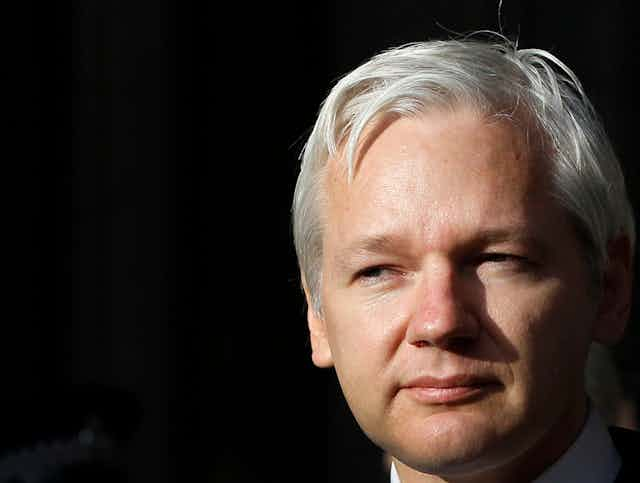In his relatively brief time as prime minister, Anthony Albanese has had very extensive contact with US President Joe Biden. According to the prime minister’s office, Albanese has had four formal meetings with him, plus two Quad meetings, and several other less formal discussions. They’ll rub shoulders again at the G20 this weekend in India.
Biden will also host Albanese for a state visit to Washington next month.
The relationship between the Labor government and the US is close, as is that, it seems, between the two leaders. But one, relatively modest (in Australian eyes), Albanese request – for the Americans to drop their bid to extradite Julian Assange – has fallen on firmly blocked ears.
Later this month, a delegation of federal parliamentarians is to travel to Washington to lobby, ahead of the Albanese visit. Its composition reflects how the issue spans the political spectrum. It includes former Nationals leader Barnaby Joyce, Tony Zappia (Labor), Alex Antic (Liberal), Monique Ryan (independent), and Peter Whish-Wilson and David Shoebridge, both from the Greens.
The trip is being privately financed by the Assange campaign. Crowd-funding attracted more than 800 donors and raised some A$65,000 to cover the trip.
The parliamentarians will lobby members of congress and seek meetings with the State Department and the Department of Justice. Australia’s ambassador to the US, Kevin Rudd, will no doubt be busy arranging appointments. The group is also set to talk with non-government organisations including the American Civil Liberties Union, the Foundation for Individual Rights and Expression, and the Committee to Protect Journalists and Reporters Without Borders.

The Assange story is well known.
His WikiLeaks’ publication in 2010 of a trove of US intelligence about American activities in Iraq and Afghanistan, leaked by then-intelligence officer Bradley (now Chelsea) Manning, was highly damaging for the Americans. The material was widely published internationally, including in Australia.
Assange took long-term refuge for years in the embassy of Ecuador in London. Finally he was thrown out of there; for years he has been in a British prison, fighting through the court system to try to prevent his extradition.
Albanese says the Assange affair has gone on too long; since Labor was elected, hopes for progress on his repatriation have waxed and waned.
A bad sign came earlier this year when US Secretary of State Antony Blinken, at a press conference in Australia with Foreign Minister Penny Wong, said he understood Australians’ sensitivities but declared it was “very important that our friends here understand our concerns about this matter”.
The actions that he has alleged to have committed risked very serious harm to our national security, to the benefit of our adversaries, and put named human sources at grave risk – grave risk – of physical harm, and grave risk of detention.
More positive sentiments from the US embassy in Canberra came to nothing.
By any logic, the US has undercut its own case against Assange by its treatment of Manning, whose sentence was commuted by President Barack Obama. On that precedent, surely, leniency should be extended to Assange.
Moreover, a distinction should be made between the leaking of official material and the publication of the material, which goes to media freedom.
Joyce argues on another front: “extraterritoriality is a very dangerous precedent”.
Julian Assange did not commit a crime in Australia – in fact he was given a Walkley [for WikiLeaks’ journalism]. He is not a citizen of the United States. He was not present in the United States when something was done in breach of US law.
If the Americans can extradite an Australian to America after an affront to one of their laws, even though he is not a citizen and never committed a crime in America, how long before the Chinese ask for the same?
Read more: A new book argues Julian Assange is being tortured. Will our new PM do anything about it?
Simon Jackman, an expert in US politics at the University of Sydney, says it is good the delegation is going, as it shows the breadth of support for action. But he stresses the difficulty of making progress with the Americans.
Among the obstacles are the strong feelings about Assange in the US national security establishment, and the political situation Biden is facing.
Jackman says the Assange matter has become conflated, in the national security context, with the Edward Snowden affair – the case of a National Security Agency contractor who leaked a large volume of Five Eyes information, which arguably had far more damaging fallout than the 2010 leak.
Snowden is now in Russia, having escaped the US justice system – which has probably made the national security establishment even more determined to pursue Assange, Jackman says.
There is also strong feeling against Assange among some Democrats, in the wake of the WikiLeaks publication of emails that harmed Hillary Clinton’s 2016 presidential bid.
Labor MP Julian Hill has highlighted a further serious complication in appeals for Biden to act. The Justice Department is spearheading the pursuit of Assange. Biden, over a long period, has been strong in his rhetoric about not interfering with that department. Australia is asking him to go back on that principle – and at a time when the department is acting against Donald Trump.
More than logic or justice, the Assange affair has become a matter of raw American politics. It is the worst of times to be making representations. With the presidential election looming next year, with a massive challenge facing the Democrats, Biden will not want to do anything to provoke his base.
Assange’s cause is, it seems – at least so far – something to which the US-Australia official friendship does not stretch.

